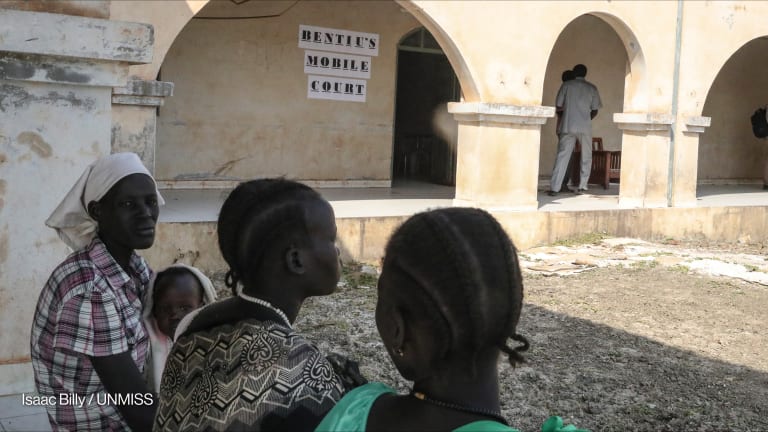
Around the world 5 billion people have no access to justice, meaning they lack the tools to resolve disputes in their lives or to seek redress through the justice system. The future of justice and its ability to meet the most basic needs of the world’s population depends on the design and implementation of a new approach that fosters access to justice for all. This new open justice paradigm is based on a simple but powerful idea: making sure that people know how to get the legal help they need — and to access their rights — from a system that is easier to use, affordable, and fair.
Far too often, people are left in the dark when they have to petition their government to address injustices. What we have seen through open government movements around the world is that government is better and far more effective when it is transparent about its activities, creates accessible systems of justice, proactively encourages public participation, is responsive to citizen demands, and is prepared to be held accountable for successes and failures. Through the Open Government Partnership, a growing number of countries are developing and implementing commitments that enhance transparency, participation, and access to justice.
The Sustainable Development Goals included this issue as one of the targets for all countries to achieve by 2030, meaning that with only 11 years to go the global community will have to look to new methods to advance towards more inclusive, just, and open societies.
In order to move forward on the United Nations agenda, justice institutions must continue to implement real commitments at the national and local level in order to meet the expectations of their citizens.
First, people must know where they can access legal aid — for example, on how to access documents on land ownership or obtaining legal recognition through birth certificates. In Argentina, the Ministry of Justice and Human Rights runs 90 Centers for Access to Justice that helped more than 500,000 people enforce their legal needs regarding just over 900,000 cases since 2017. The ministry also created and maintains an open data portal that provides reliable information about its work, such as corporate registries and processes for judges’ appointment. The portal also provides data and information related to cases from the local provincial judiciaries.
Second, police, lawyers, social workers, and paralegals all need the tools and resources to do their job properly. In South Africa, civil society opened Community Advisory Offices to ensure access to legal services at the grassroots, community level. Similar programs have been launched in Indonesia and Sierra Leone. To ensure the offices have the resources to keep the work sustainable, it is critical for governments to institutionalize support for their functioning.
Third, it is imperative that justice forums, including courts, are open, fair, and sensitive to the needs of different populations. In Sri Lanka, after the passage of a new Right to Information bill, the government launched a campaign to increase citizens’ knowledge of how it could impact them. The campaign specifically targeted the underserved, including welfare recipients and women. Soon, villagers even in remote areas, were receiving assistance on how to apply for payments they were owed by the government. Justice was finally served when the long-overdue reparations began to be paid. In Uruguay, there is a focus on how justice impacts people with disabilities, and in Afghanistan, the government is establishing special courts to deal with gender-based violence.
New government policies must be more effective in enforcing people’s rights, but also reduce the barriers to those they serve by becoming more accountable and transparent. It is crucial for the justice system to be more open to the public whilst providing better access to all people, especially vulnerable groups who are disproportionately impacted by lack of justice on issues like land rights, violent crime, and corruption.
We are determined to accelerate the fulfillment of the 2030 Agenda in the field of justice. For this reason, we are launching a coalition of governments, civil society organizations, and international partners on open justice within OGP. The coalition will provide a framework for cooperation, exchange, and international debate, focused on closing the justice gap by implementing open government and open justice reforms. Through this coalition, we will seek to ensure that OGP is a critical partner in achieving peaceful, just, and inclusive societies. We invite those who share this vision to join us.
Update, July 27, 2019: This article has been updated to clarify that civil society opened Community Advisory Offices to ensure access to legal services at the grassroots, community level.
Update, July 23, 2019: This article has been updated to clarify that the Ministry of Justice and Human Rights in Argentina runs 90 Centers for Access to Justice that helped more than 500,000 people enforce their legal needs regarding just over 900,000 cases since 2017.
Read more on justice and the SDGs
► Funding access to justice, a 'cross-cutting enabler of the SDGs'
► Q&A: IDLO chief on need for 'top-down, bottom-up' approach to justice









